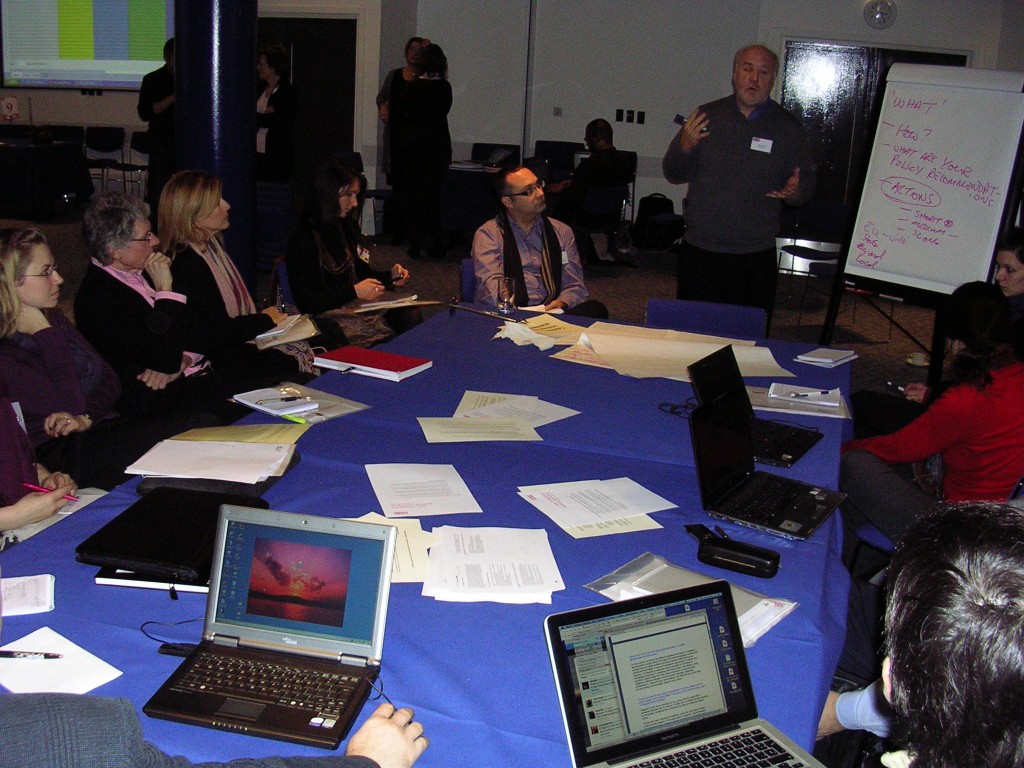One group tackled the subject of celebrating and promoting science, and they began by thinking about the different tools which can be used to do this as well as the ways in which science is communicated. They also used this time to discuss some of the issues and barriers which might impact on this area.
Here are some of the thoughts which they came up with and discussed in the process of designing their policy recommendations, and how those ideas evolved:
- promoting science can be done by journalists and the media
- the need for promoting the understanding of science and scientists in an understandable way
- promoting science and the work of scientists
- showing importance of science for ordinary human beings
- to achieve positive attitudes towards science
- to improve confidence
- to reinforce the connection between the public and scientists
- to establish partnerships between scientists and journalists so that journalism can be the link between science and the public – this also involves educating the journalists first
- career opportunities for scientists?
- communicate results of scientific work – public relations for science
- produce videos to present scientific work in a positive light
The group then worked to come up with their recommendations for policies which celebrate science and scientists, and how those actions might be implemented at EU, state, regional and local level, over a series of time frames (0-5 years, 5-10 years and 10-20 years).
These were the thoughts which the group came up with, relating to positive attitudes to science:
- combine science and games
- organise shows to make clear how science solves everyday problems
- more education based on science – modify curriculum
- bringing people to science
Working to improve confidence:
- can’t be said that science is perfect
- there’s a need to provide tools to erngage public in the relevant questions
- ensure the public feel equal in that process to get real dialogue
- promote understanding of the problems scientists encounter in their work
- create confidence in the ways that science serves society and the public at large
Projects that were suggested included:
- funding for science theatre
- funding for science communication competition
- scientists in places where they are not usually seen e.g. libraries
- fund scientist and non-scientist forums
- combine science with other topics e.g. sport (‘science is in everything’)
- fund more books like the New Optimists
- funding stronger links with science centres and SMEs
- more internships for children to bring them into science (experience research/working in a lab, etc)
- student science conferences for students aged 12-18 years
- funding for science museums
- funding for partnership between science and the media
- summer science schools for students and for teachers
- pay universities to adopt schools
- European equivalent of the Discovery channel to widen coverage of science topics on TV
- organise courses for science communications
- teaching science using comics and cartoons
- after school programmes for children at science museums
- tell science as a story – evolution of science
These projects were recorded in a Google Documents spreadsheet, and the group were given A5 cards to record their own thoughts which will then be displayed on the wall. The policy recommendations will be presented and discussed further during tomorrow’s session.


Pingback: Marcos Perez talks about enhancing science communication at the CASC conference | CASC
Have you all seen the ATLAS project? If any of you have time today, visit Thinktank’s ‘sci-art’ corridor on level 3 and see how physicists from CERN talk about their work to the public, revealing there everyday lifestyles in the process http://bit.ly/dKb2di
Pingback: Policy recommendations for celebrating science and scientists | CASC